Our guide, who introduced himself as Bee, was waiting in the lobby of our hotel at Coffee Bay on the wild Wild Coast of South Africa’s Eastern Cape. It was going to be a scorcher of a day, but we’d decided, anyway, to do the walk to Hole in the Wall. After Table Mountain in Cape Town, this is said to be one of South Africa’s most spectacular, and most photographed, geological features.
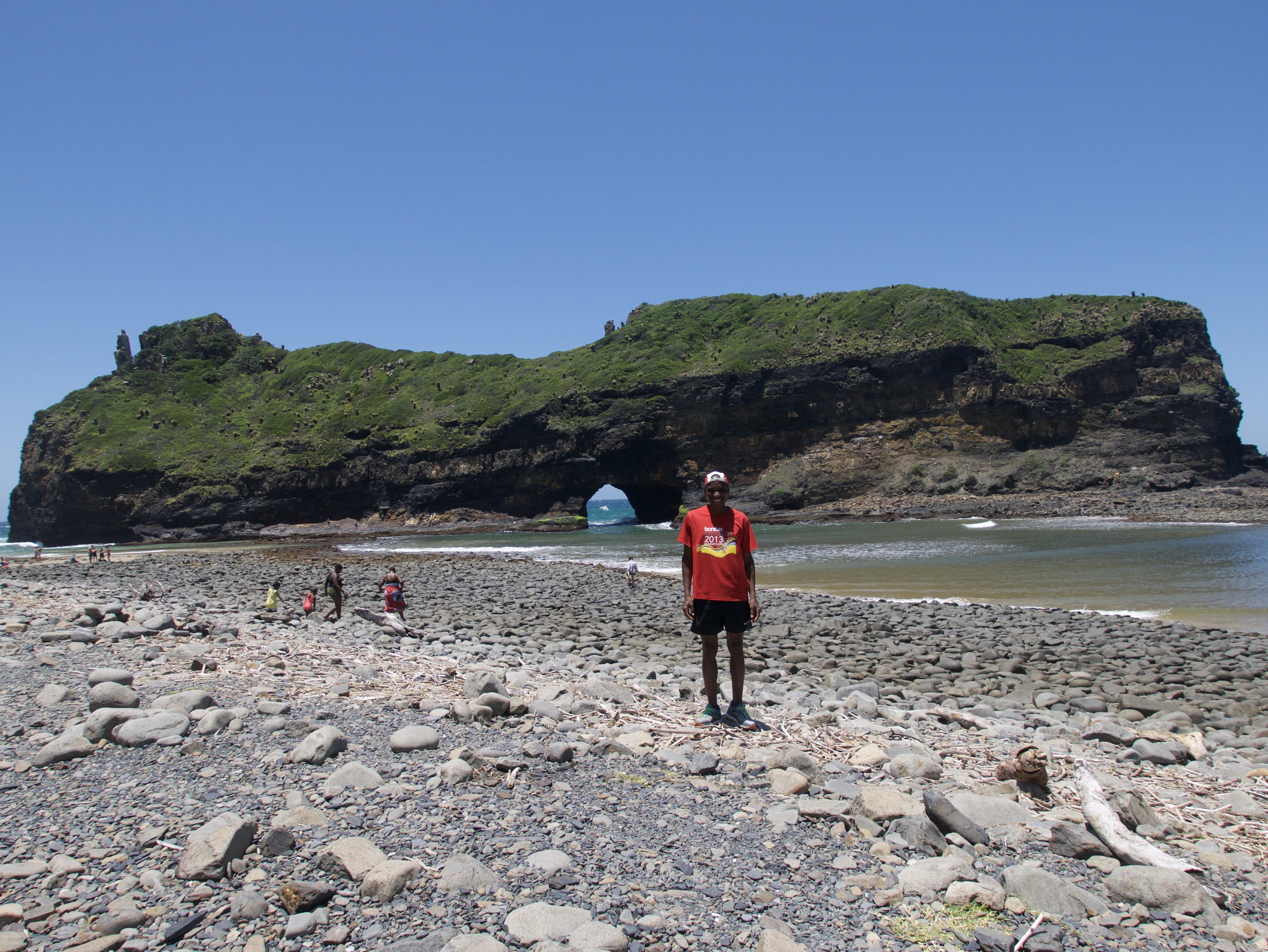
Moyisile Simayile, aka ‘Bee’ at our final destination – Hole in the Wall
The hotel had given us a list of essentials for the walk – namely suntan and plenty of water – so, I couldn’t help noticing that, aside from a small and very basic feature phone, Bee was empty-handed.
‘Do you have water?’ I said.
‘No, mam,’ he responded, ‘I don’t need it’.
At 8 am in the morning it was already hot, but it was forecast to be 30-degrees celsius, and windy. We were walking a 10-kilometre stretch of this rugged and rolling coastline, and so I went to fetch an extra bottle.
Bee seemed grateful to accept the water on the few stops we made, although he was quite used to walking without it. Before meeting us, he’d already walked the same distance from his community, about another 10 kilometres from the hotel. Besides, he is a Comrades silver medalist, and when he is training, in the cool of the day he can run 30-kilometres without a drink.
I was impressed. To win silver in Comrades, the annual +-90-kilometre ultra-marathon between the cities of Durban and Pietermaritzburg in Kwa-Zulu Natal, you have to run it in under six hours. And you must have commitment. It’s a gruelling route, and one I know well. Depending on whether it’s an up-run or down run – this alternates yearly – my childhood home was just a short walk away from roughly the quarter/three-quarter mark. Each year we’d wake at dawn and cart the skottel-braai (a gas BBQ) down the hill and cook breakfast while cheering on the first runners. If we weren’t at the finish to welcome one of my uncles, who both ran Comrades at some point, we could there all day.
It could be worse?
The first kilometre or so of the walk to Hole in the Wall was flat. After crossing the main beach at Coffee Bay, we took off our trainers to wade across the mouth of the Nenga River. A gravel road lined with women selling beadwork took us past a youth hostel, coffee shop, and a few other establishments. Local people chatted to Bee, and some asked him for money. After ascending a short hill, we swung left and followed the narrow dirt track that would take us five breathtaking hours later to our final destination.
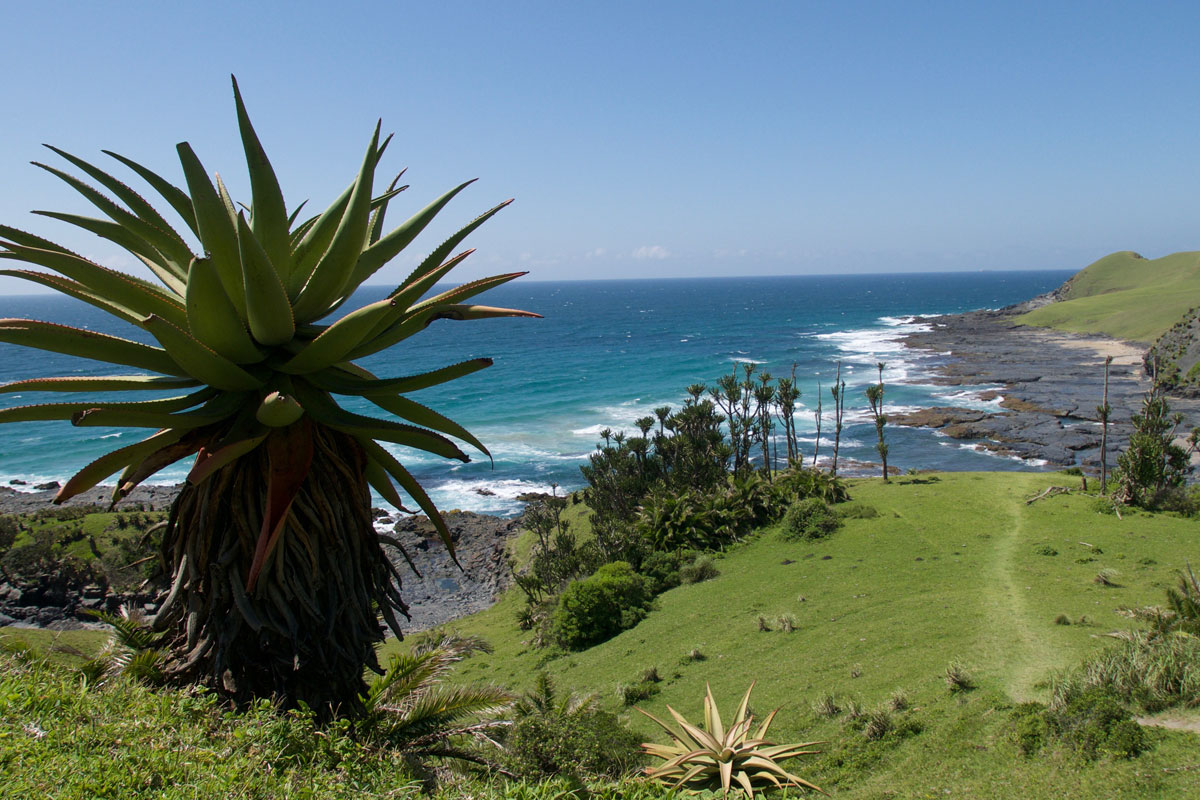
The scenery is breathtaking!
At the top of the first incline Bee stopped briefly and, as we caught our breath, he pointed back in the direction from which we’d come. ‘You see that hill there, beyond the hotel. Behind that is my community,’ he said.
I asked how him far he lived from the ocean, and he replied: ‘It’s just a short walk, mam.’
Looking back across the emerald undulating hills, and the Indian Ocean in shades of blue doing a glittering dance below, I couldn’t help thinking: ‘Well, it could be worse’.
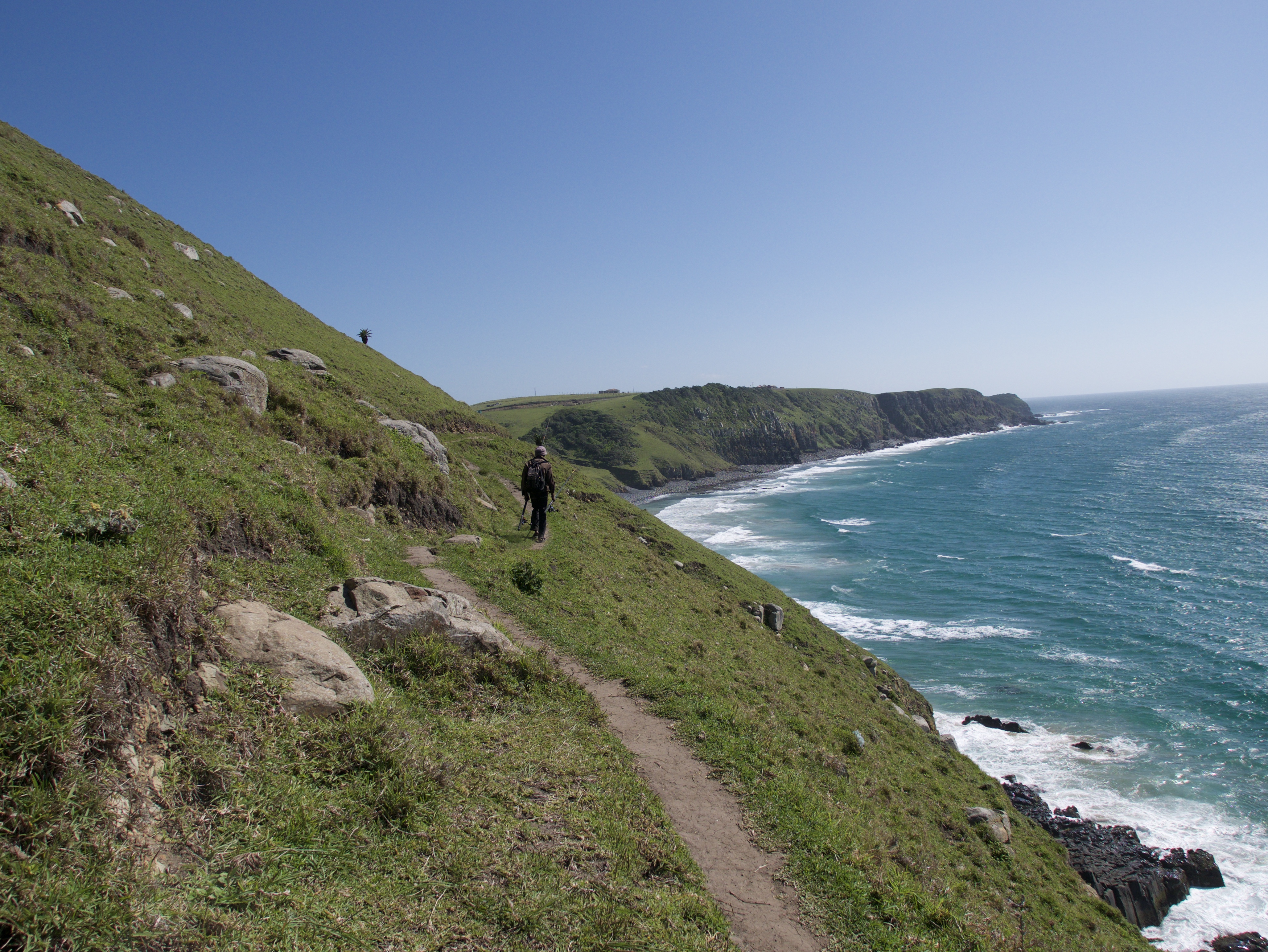
Looking north, a herdsman heads in the direction of the hotel
Small mercies
Nobody could dispute that Bee wakes each morning in a magnificent setting. But he wakes without electricity; Bee and his wife and three children must still walk to collect water. Here, unlike in the parched Western Cape, there has been rain but life is tough.
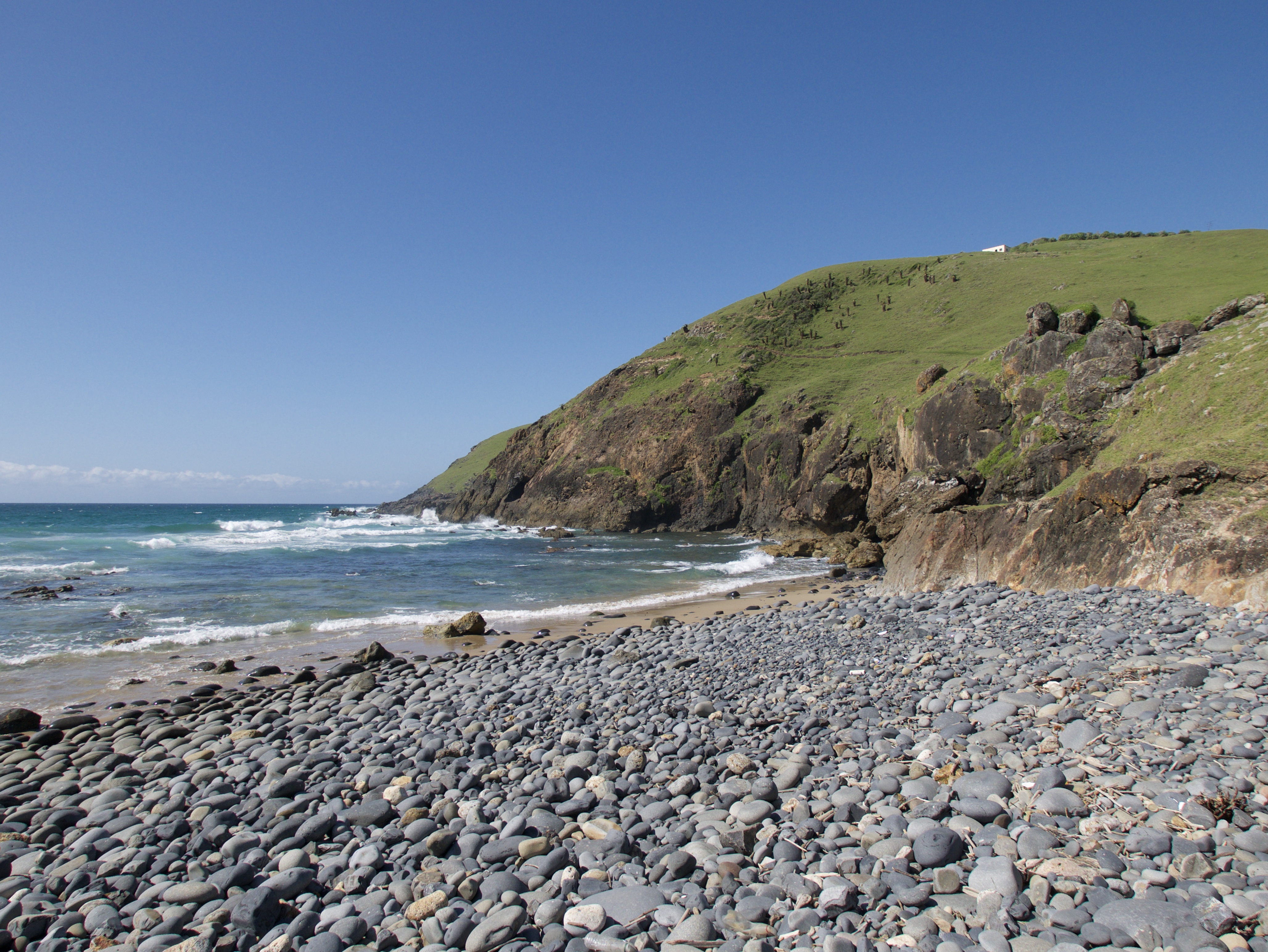
The Wild Coast is in what was formerly the Republic of Transkei, the birthplace of Nelson Mandela and other comrades including Oliver Tambo (who has a municipality named after him), Walter Sisulu and Chris Hani. The Transkei was one of the ten so-called Bantusans or ‘homelands’, which were established as part of apartheid policy to separate people into ethnically segregated areas. On October 26, 1976, six years after Bee and I were born, the Transkei was one of four homelands to be made independence, a move that the United Nations called a ‘sham’. The justification from South Africa’s then defence minister, James Kruger, as Gay Seidman wrote that day in the Harvard Crimson Review, was ‘actually rather simple’. ‘Blacks and whites are different, and it makes sense to give them different land areas they can call their own,’ Kruger said.
Those dark days are over but new patterns of exploitation and corruption, are keeping the region desperately poor, and Bee feels disillusioned; the government, he said, simply hasn’t delivered on promises and cronyism is alive and well.
Since January, when Bee and I met, Zuma has fallen, and South Africa has a new president – Cyril Ramaphosa. Hopefully change is coming but there is still a long way to go.
Simple, it isn’t
Bee had some enterprising ideas. With the number of tourists flocking to the area, one was to build another rondavel and run a guesthouse. Safety, he said, was not an issue but with no electricity, running water or Wifi, this could be a problem for people from the cities. It was also too expensive. He had done his research and it would cost about ZAR5,000 (about £300) to build.
Another idea was to buy a small motorboat, perhaps a six-seater, to take tourists up the Mtata River. He’d already contacted the relevant government authorities and discovered that he could get a licence to build his own jetty. If he had his own boating business, this would make him less dependent on the piecemeal guiding work he gets from the hotel. Hotels and guesthouses are the biggest employers in the area but because transport links are weak they tend to rely on people nearest. As Bee lives 10 kilometres away from the hotel we were staying at, the work was unlikely to be regular.
When Bee isn’t walking with tourists, at the most twice a month, he catches fish to sell to local establishments and people. Though more closely monitored now because of quotas, the Wild Coast is a fisherman’s paradise. Anglers come here to battle with sharks, and game fish like barracuda and bonito. For Bee and his basic fishing rod it’s the smaller fry – galjoen, bronze bream, queenfish or mackerel.
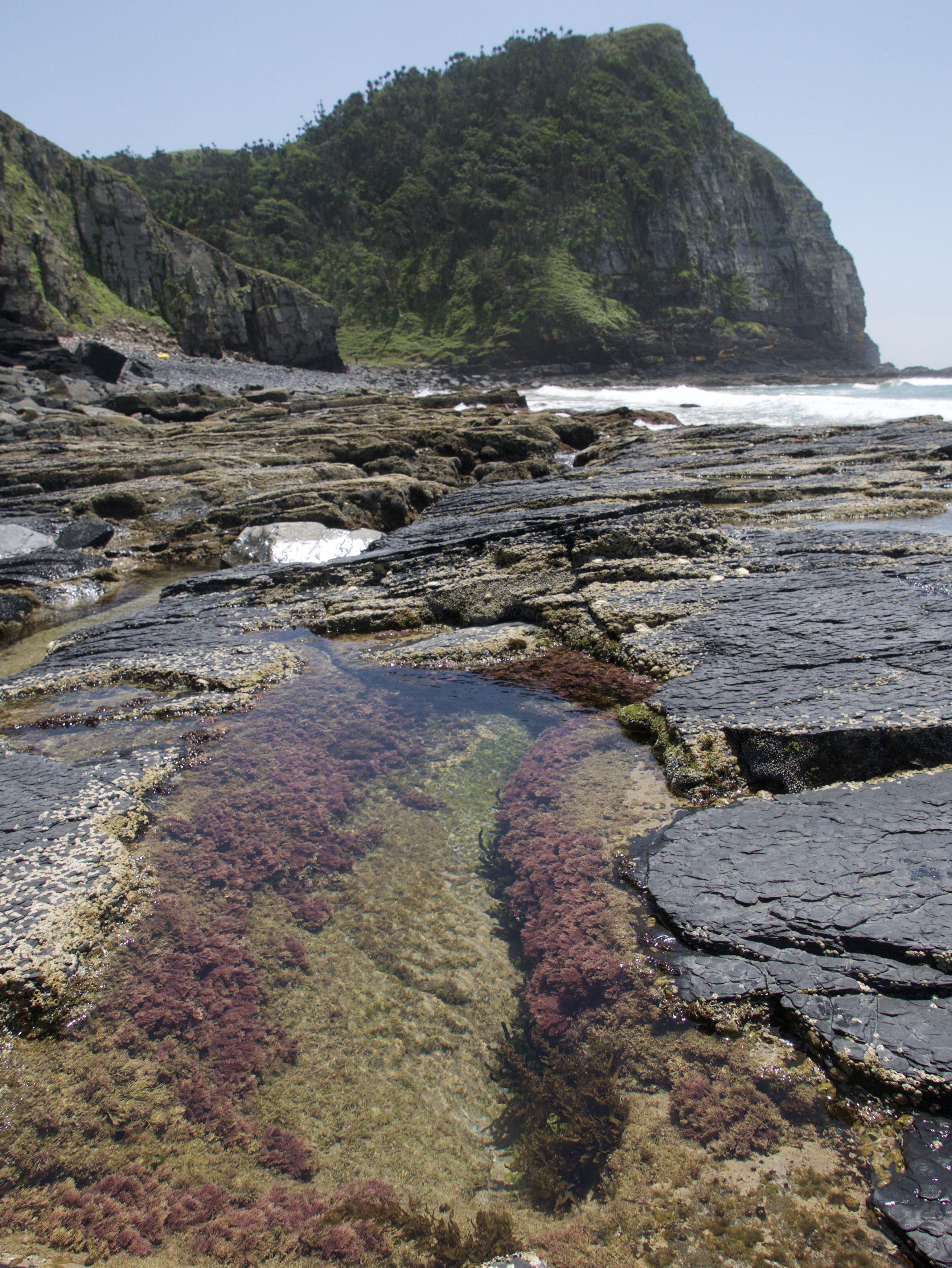
With my travel industry cap on, I started to wonder if Bee could list on AirBnb Experiences, like a friend of mine in London who is now earning a half decent income from his suburban cycling tours. I could write his profile for him, and his first review.
If only it were that simple.
Recently, I’ve written about how a company called CryptoCribs is using blockchain to enable travellers to pay for accommodation in crypto! But forget bitcoin, Bee doesn’t have a smartphone, let alone Internet access. Another problem is that working with the hotel means that the 4×4 is there at the end of the walk to take the guests back, a service he can’t offer.
Pondering Bee’s predicament, our walk continued.
Donkeys and a dilemma
Suddenly, Bee stopped. ‘Look, look there,’ he said, pointing to a dark, triangular shape gliding in the ocean shallows below.
We paused for a few minutes, our eyes transfixed on the water. Above us, two yellow-billed kites were riding the thermals. What’s that, what’s it called?’ asked Bee,
‘It’s a ray,’ said Fergus, my husband, and for the next 30 minutes or so we fell silent to the wind and the waves. Nimble and light-of-foot, Bee walked briskly on ahead.
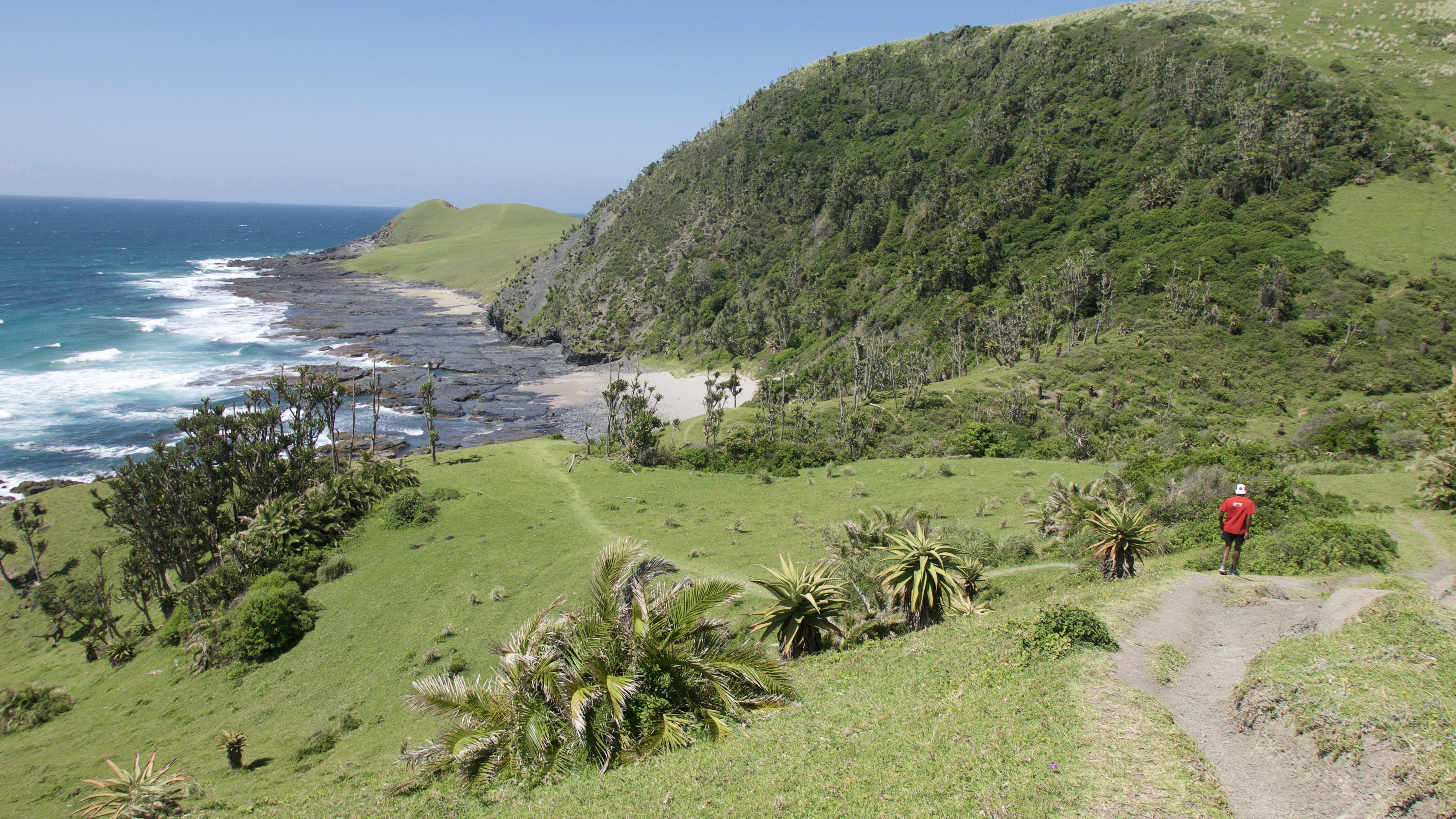
A little later, he stopped to wait for us to catch up, and catch our breath. He pointed to a rural homestead on the hillside where a woman was bent over weeding a field of cabbages. Subsistence farming in the region is widely practiced, very often by women. Bee, who grows his own vegetables, explained that usually there is one cow in a village that people use to till the land.
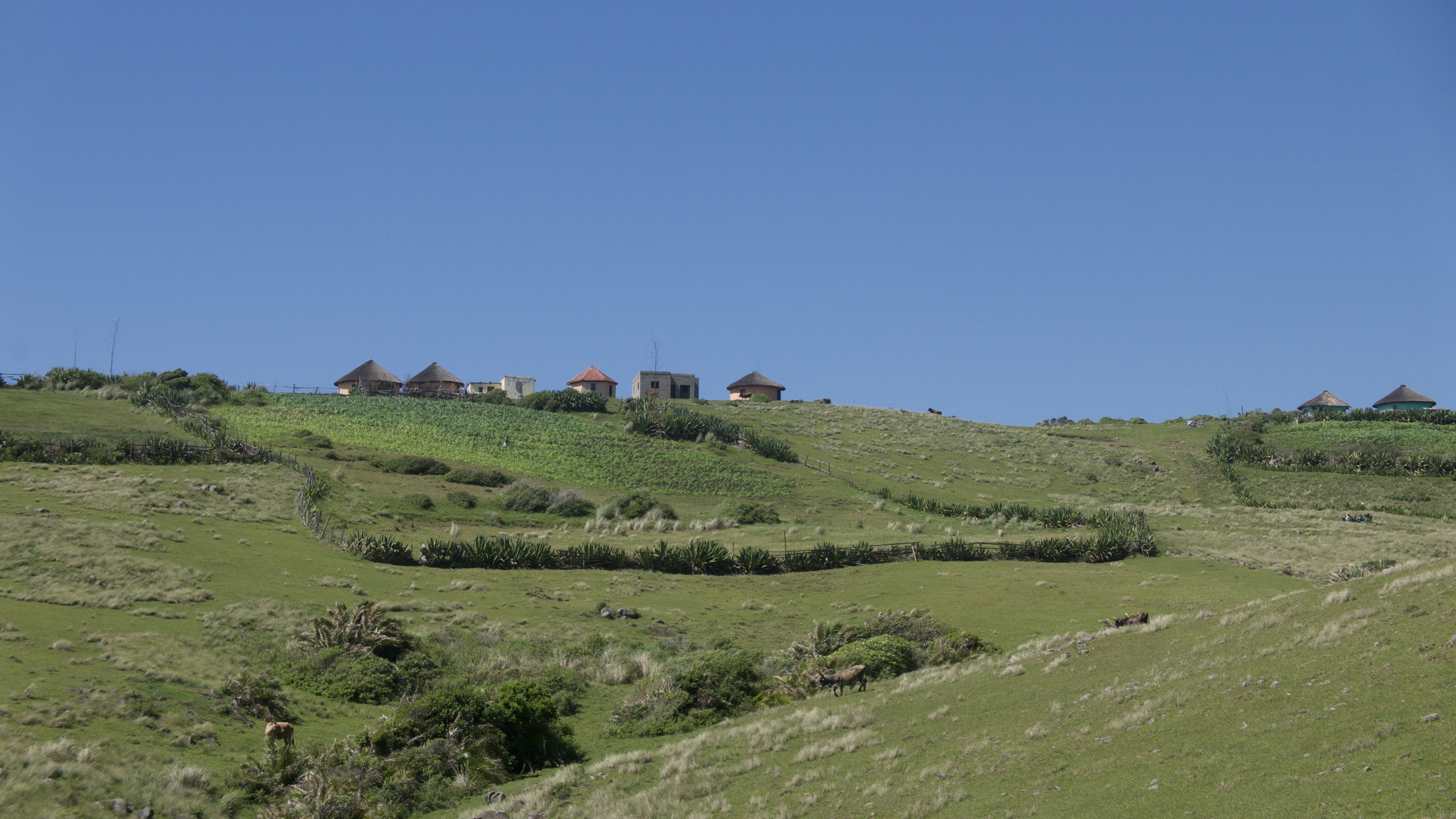
The next grassy descent, dotted with indigenous sub-tropical shrubs and trees, was to a bay where we found shade under a rocky overhang. Bee wandered off to scour the beach, returning few minutes later with the shell of small perfectly formed cowry, once used as currency in many parts of Africa.
‘What is this?’ he asked, ‘a mussel?’
Thanks to our apartheid education, Bee did not have knowledge of South Africa’s ancient geological formations or flora and fauna in English, something he could benefit from as a guide for international tourists. For the record though, nor do I know them in Xhosa, or for that matter Zulu, which regretfully I don’t speak, and I spent 21 years of my life in Kwa-Zulu Natal.
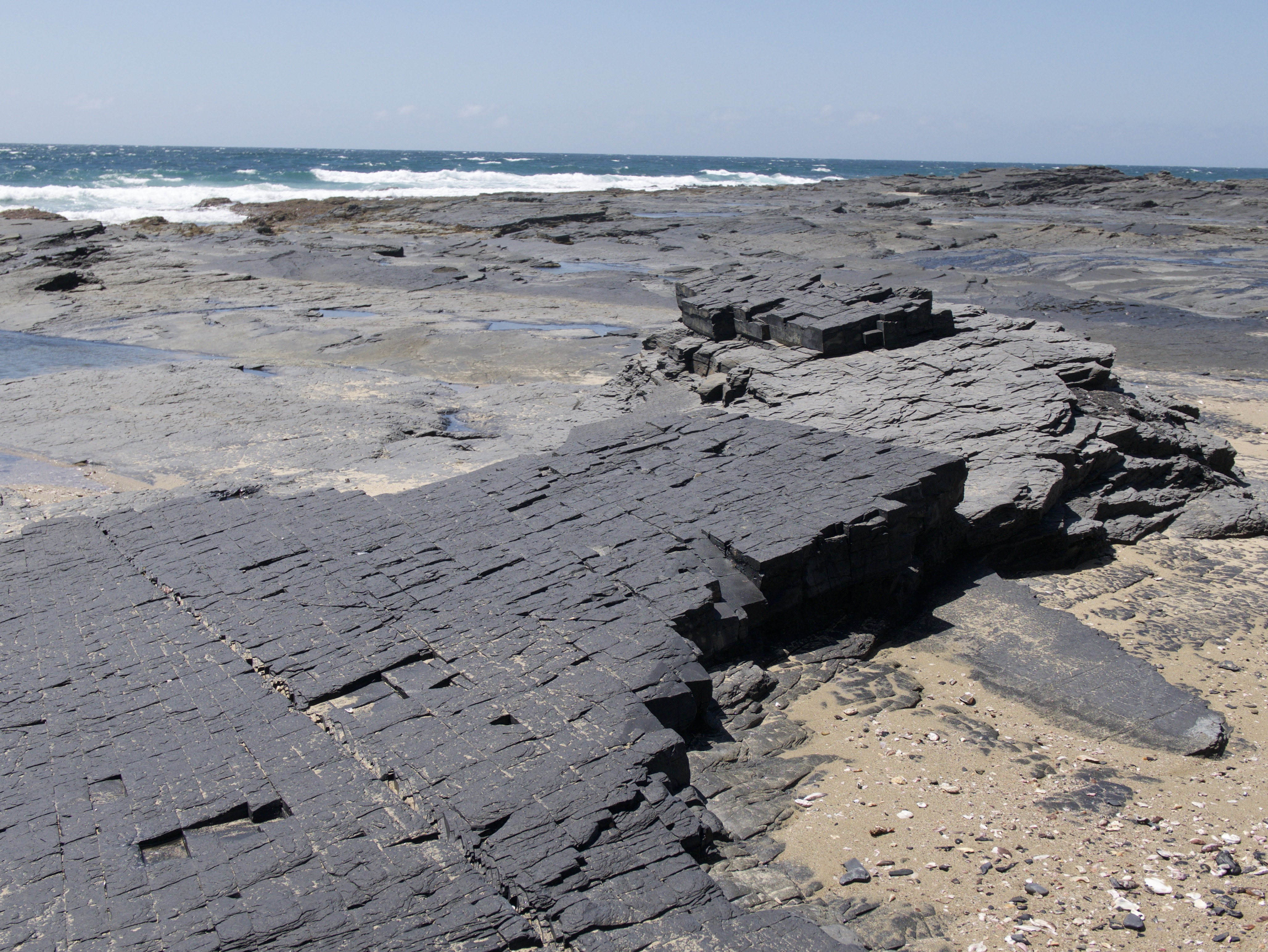
The next sandy stretch was deserted but for a few donkeys and four barefoot boys. Bee told us they were probably bagging up sand for building work in the village. As we got a little closer, I smiled and took out my camera for a snap. But the elder of the three boys, perhaps 14, held up his hand in defiance. Bee shook his head, and I dropped my camera.
They want money,’ he said.
So, I took out a ZAR10 note and handed it over. The boys didn’t pose and they didn’t smile but I took the picture from a distance. I wish I hadn’t and left me feeling uneasy. Bee was uneasy too but for different reasons. He thought it wrong that they wanted money. “They should be happy to promote the area because that would bring more tourists like us and help boost employment,” he said.
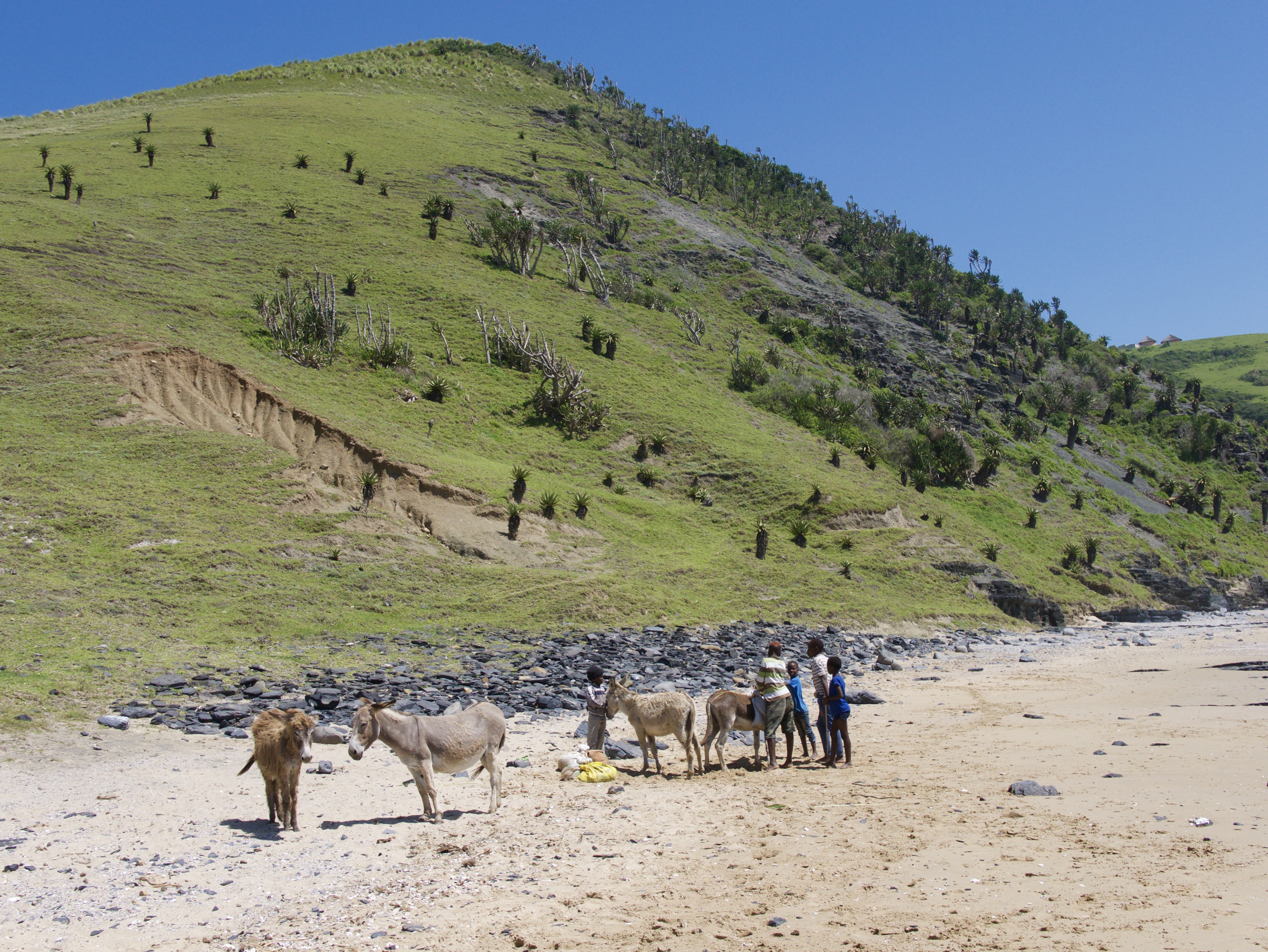
Boys bag up donkeys with sand
Some weeks later, I relayed this incident to an octogenarian activist, historian and family friend. He said he’d raised the issue of photography and the payment of vulnerable subjects at the exhibition of a well-known South African photographer. His question: do the people whose lives are being captured in these images benefit from the proceeds of the work? There was an uneasy silence.
Everybody has a right to earn a living, as my husband said. So wasn’t this, then, a straightforward transaction, an early sign of entrepreneurialism?
If only. If only it were that simple.
Micro-finance for rural areas is non-existent
According to South Africa’s Small Enterprise Development Agency (SEDA), the biggest challenge facing small to medium enterprises (SMEs), never mind micro ones, is access to finance. Banks tend to want to fund SMEs in the later stages of their development, and in rural areas it’s even harder.
Michael Flockhart is the executive director of Sportstec, a social enterprise that uses sport as a vehicle to enhance education in South Africa. He has also established a development fund, in line with corporate responsibility commitments, and is currently funding and running a entrepreneurial education programme in the Northern Drakensberg. Echoing the findings of SEDA, he told me that it’s incredibly difficult to raise money for micro-enterprises in South Africa, and in rural places like Coffee Bay it’s impossible.
Michael is my younger brother’s best mate and I called him last week because I thought he might have some ideas about how I could help with one aspect of Bee’s work – Tshani AC, a running club that he has established to support children in his community. .
A growing problem in the Eastern Cape is alcohol and cannabis abuse, even among children; cannabis, locally known as ‘dagga’, is widely grown and easily accessible. Bee wants to show these children another way, and like Michael, who was a gifted cricketer, he sees sport as a way to address this.
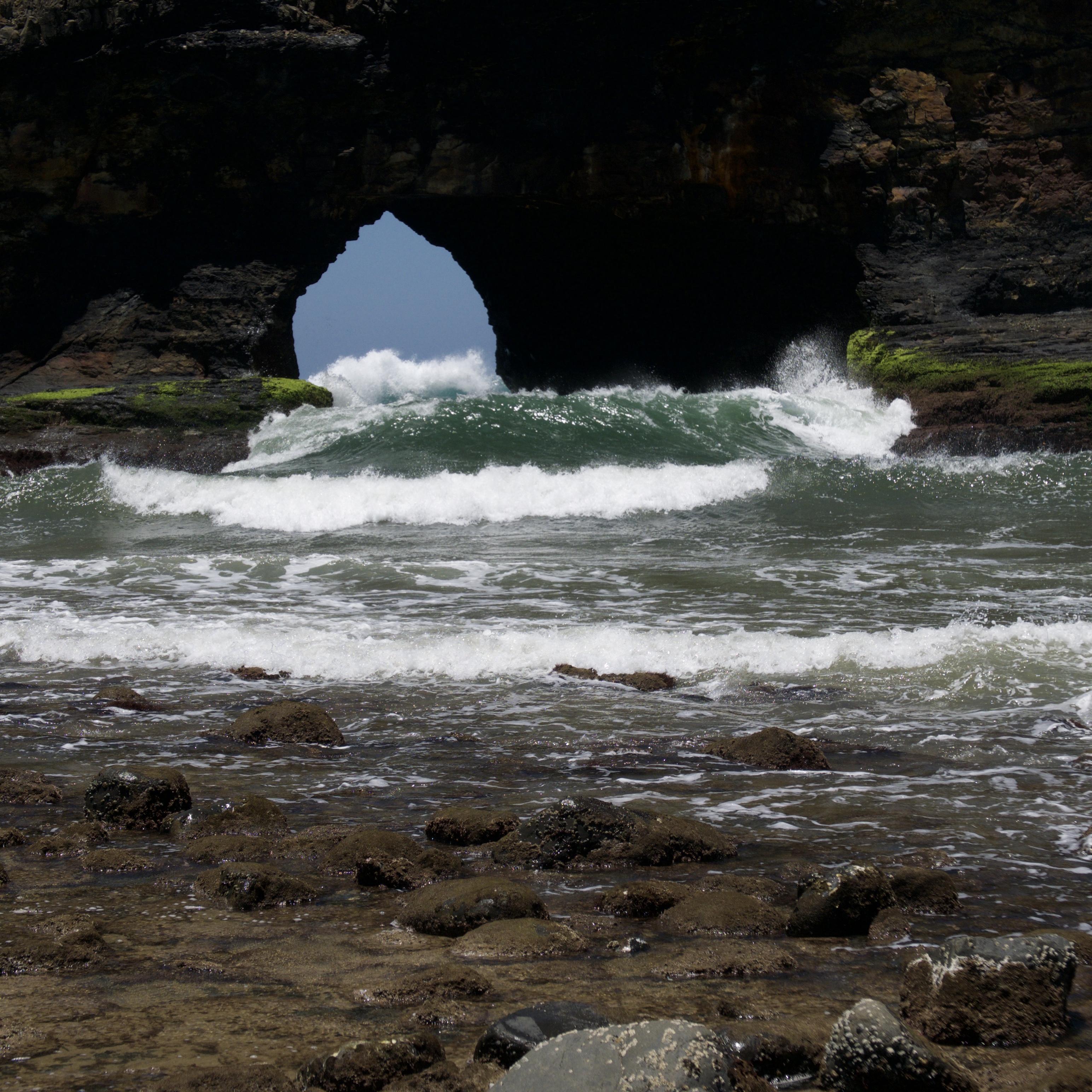
In isiXhosa, Hole in the Wall is known as ‘esiKhaleni’, meaning ‘place of thunder’ because of the thunderous sound of waves at high tide. Folklore also suggests that it is a gateway to the Xhosa people’s ancestors.
With Bee I had joked: ‘So can we expect to see some Olympic athletes coming out of the Eastern Cape?’
His response: ‘Sjoe mam. They are fast. There are three who are very, very fast. I don’t know how fast, but fast.’
If he had a stopwatch, Bee said he would send me a report once a month.
When I relayed this story to Michael there was a pause before he said: ‘Jeez Pam, the hairs on my arms are standing up’.
We need sustainable development
Since I’ve been back in London, Bee has been on my mind. It is an accident of birth that has led the pair of us, both born in 1970, on entirely different trajectories. I’m not saying my life is better. People like me willingly pay more for a week, than Bee probably earns in year, for a holiday that notionally resembles his daily life. One of our favourites, Featherdown Farm Days , will set you back about £539 in May a week for the privilege of candlelit dinners, wood-burning stoves and long country walks. Nearly double what it would cost Bee to build another rondavel!
Bee doesn’t want to leave this community and why would he. It is one of the most beautiful places on earth. But he does want to improve his family’s life. Electricity and water in his home would be a good start. Finance for a sustaining a small business would be even better.
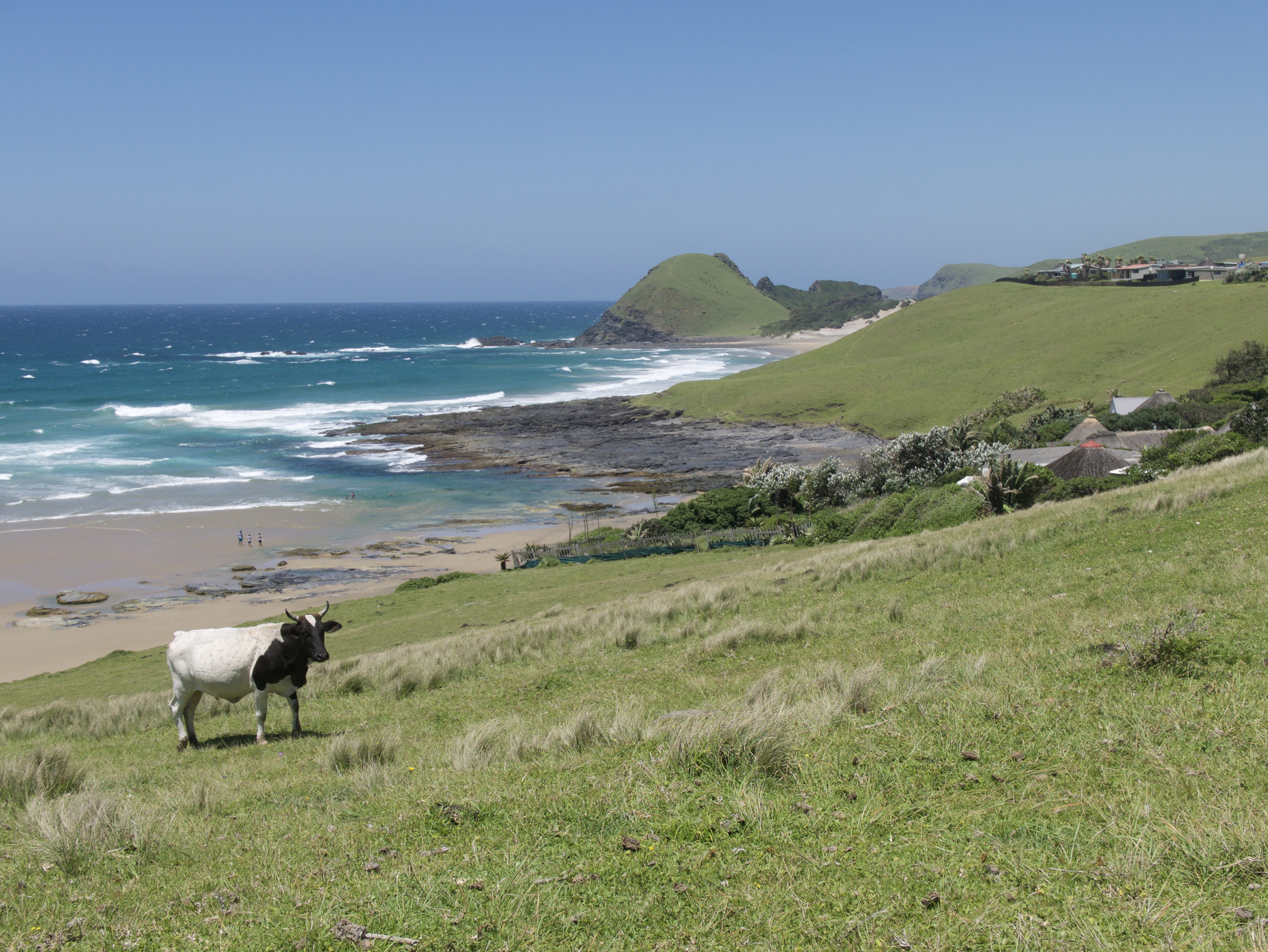
An Nguni cow and, in the distance, the coastal settlement at Hole in the Wall
At the countless African business conferences I have covered over the years, I have heard about how Africa’s SMEs will be the ‘stars of the rising continent’, the ‘lions on the move’, ‘a way out of the continent’s socio-economic and political woes’. Yes, I’ve written such bullshit, and it’s starting to get monotonous.
But let me not be too cynical. There are success stories in South Africa and across the continent. In 2016, for example, I interviewed the renewable energy companies of Abengoa Solar, a Spanish multinational, and Californian-headquartered SolarReserve about their community-led projects. These were a pre-requisite for the winning multimillion rand tenders to build solar power plants in the Northern Cape province. Though not always straightforward, there had been some heart-warming and tangible results.
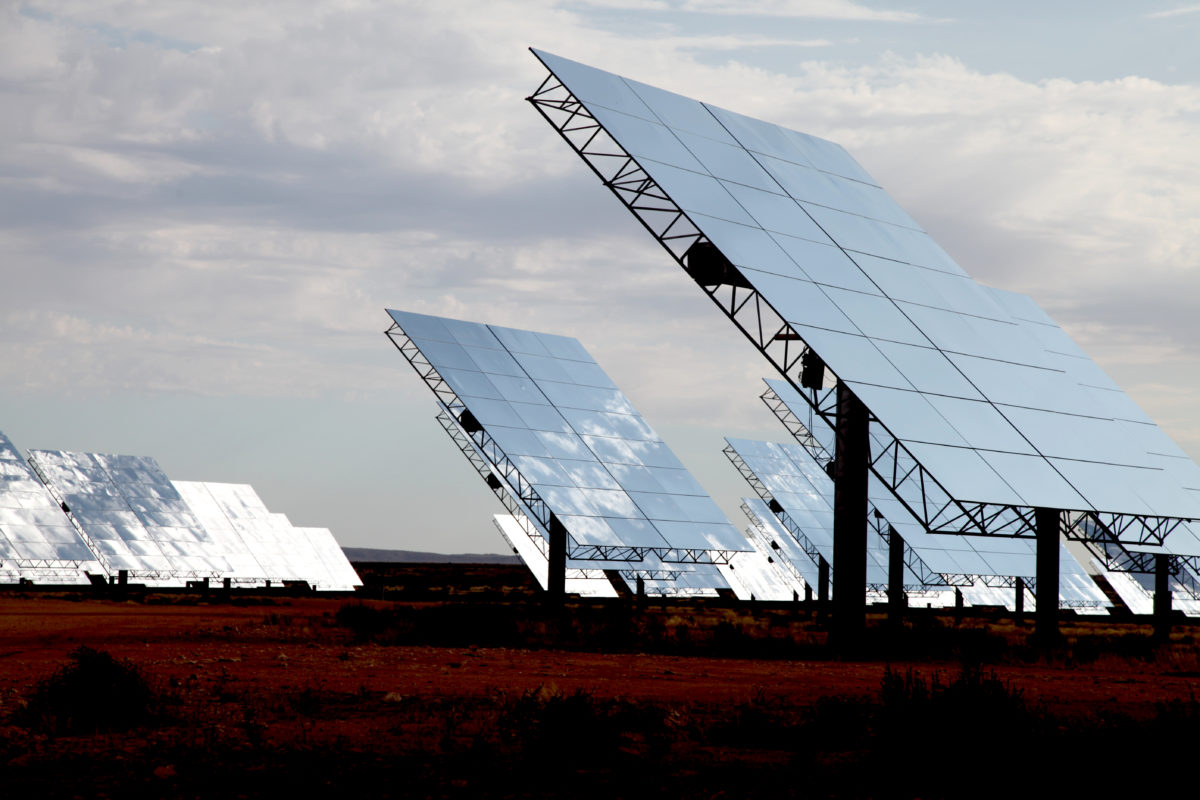
Solar panels in the Northern Cape by community contractors
One was that of woman-owned Phambili Basie Contractors and Projects. Julie Basie, a mum-of-three, who ran a small grass cutting and cleaning business, and was employed in the early development stages of the Jasper Photovoltaic plant near Postmasburg. When the site became fully operational in October 2014, her business couldn’t cope. As part of its local content requirements, Jasper funded commercial cleaning equipment, tractors, grass-cutters, brushes and more. When I interviewed the team back in 2016, Julie already employed 30 people and half were women.
What African business conferences always stress is the importance of agriculture, and that is true in the Eastern Cape. But tourism is also a major source of income, and a huge opportunity to build sustainable businesses.
The South African government must step up, and big business must too. This doesn’t mean making the dubious practice of bribing chiefs to sell tribal land easier, or giving property developers carte blanche.
A helping hand
I’ve decided I want to help Bee, so what is the solution? It isn’t simple.
I could give him some money to buy a boat but to really make a difference, skills in basic business planning are vital. There must also be continued support, and not just in the early stages. Michael’s charitable entrepreneur programme in the Drakensberg is an example of how this is working. In an ideal world, this would be possible for Bee locally. But he can’t stress enough the importance of getting the right partners; people that truly believe in sustainable development.
Michael wants to help. He is often in the Eastern Cape, and can collect Bee and bring him to his centre in KZN for a month. Accommodation would be free, and he could spend some time understanding how a rural sports programme for children is run, while learning some basic business skills.
That seems an excellent opportunity, and I’m very grateful.
But better still, is there any way we could fund something like a community training centre for hospitality. For many people on the Wild Coast, tourism is an important source of income, and training would benefit people like Bee. More detailed knowledge of South Africa’s ancient geological formations, flora and fauna would put him in another league, for example.
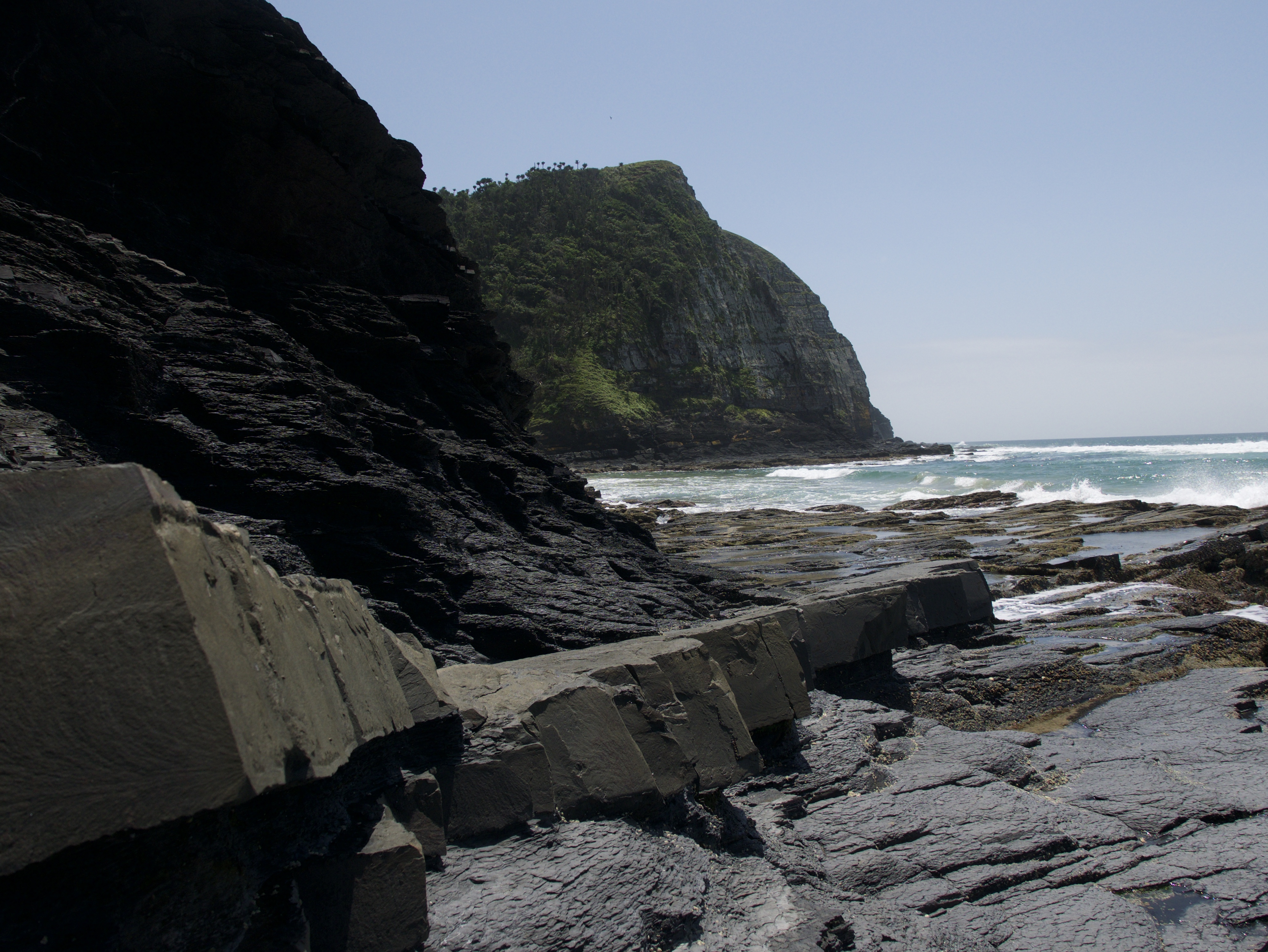
Jagged edge
Airbnb which launched in the name of community was valued at $31-billion in 2017, making it second only in size to Marriott. Today, the platform is a global hospitality heavyweight, and already offers over 50 homes on South Africa’s Wild Coast and 300 across the country.
And, then there is Booking.com (14,000 South African listings), or Expedia (6254 properties), at the time of looking. Could these industry middlemen lower their commissions, which can be as much as 30%, for margin-stretched hotels in highly seasonal areas like Coffee Bay, to invest in more people like Bee. It’s a long shot, but maybe they would with the right government policies in place.
The words of Julian Lopez, who was country manager of Abengoa Solar when I interviewed him back in 2016, still stick in my head. ‘In the end we are all humans. It’s not just about the business, about independent power purchase figures and sales. Yes, the energy benefits are important, but what I’ve learnt here in South Africa is that it’s really about people.’
Cowries just aren’t enough
Back at the hotel, we tipped Bee. He seemed genuinely surprised and grateful, as he wrote his Xhosa name, Moyosile Simile, and the name of his running club and phone number in my diary.
[If you are in the ever in the region and want to book him direct, his number is: 0634266155]
At dinner that night, Bee’s predicament dominated our conversation. My mother and son had done the 4×4 journey to Hotel in the Wall where we were collected by the hotel, but hadn’t spent five hours with Bee. I told her that we had talked virtually the whole 10 kilometres. ‘I bet you did,’ my mother said, with only a hint of sarcasm.
The next day I heard my son yelling: ‘Mum, Bee is here.’
Outside our hotel room Bee was standing in the same red running shirt and trainers he’d been wearing the day before. ‘Here Mam, he said, opening his hands with a few more cowries that he’d collected on the beach below his rondavel. Take them Mam,” he said, pressing them into my hands. ‘And Mam, what are they called again?’
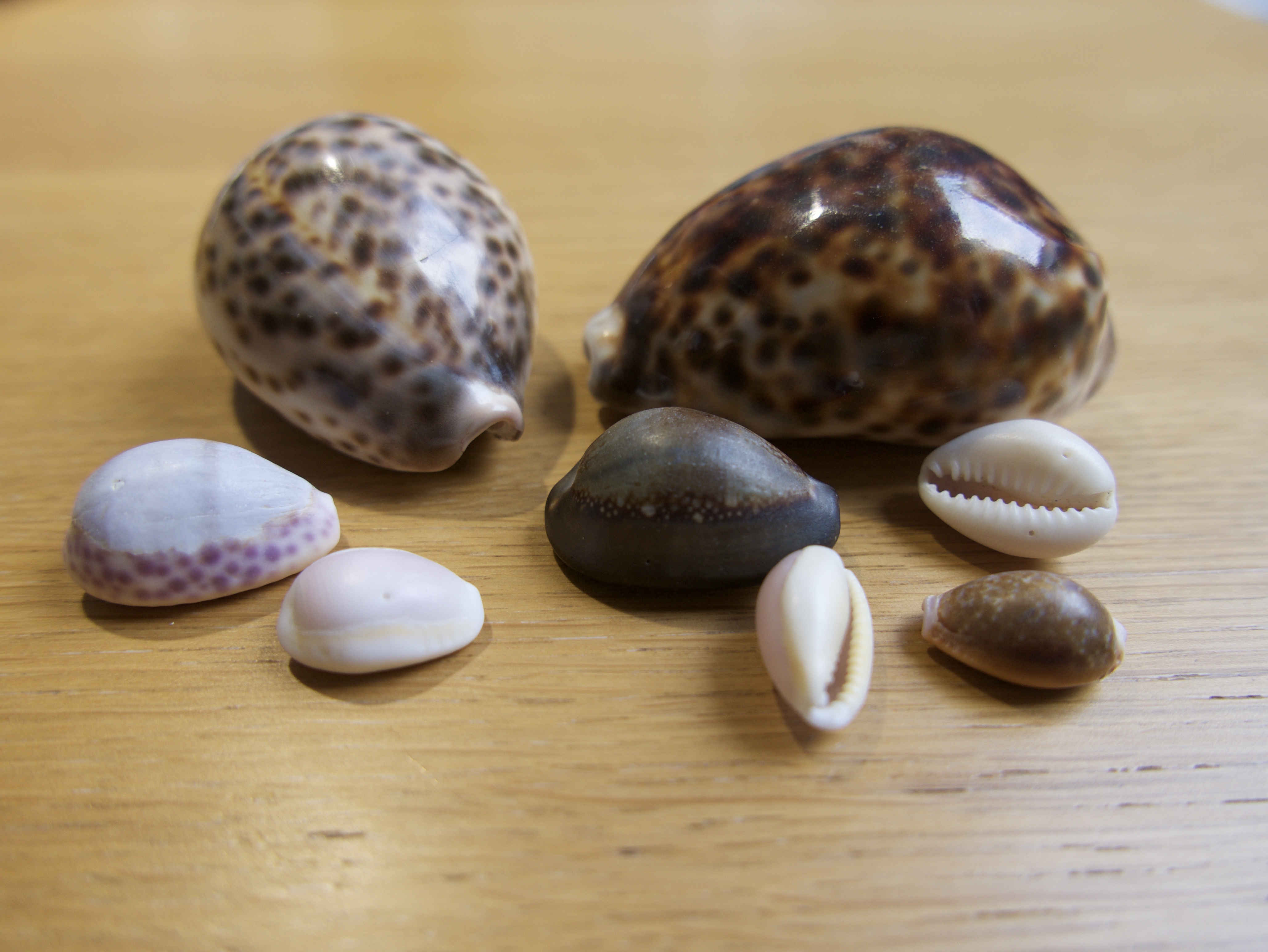
The smaller cowries were gifts from Bee. The two large shells were found in the Eastern Cape over half a century ago.
‘Cowries,’ I said.
And before I could say anything else, or suggest paying him something, he smiled, and bounced off.
So, Mr Ramaphosa, the new South African regime, and big business can you think about way to truly support micro-businesses in the OR Tambo Municipality, the birthplace of Nelson Mandela? Because cowries just aren’t enough.
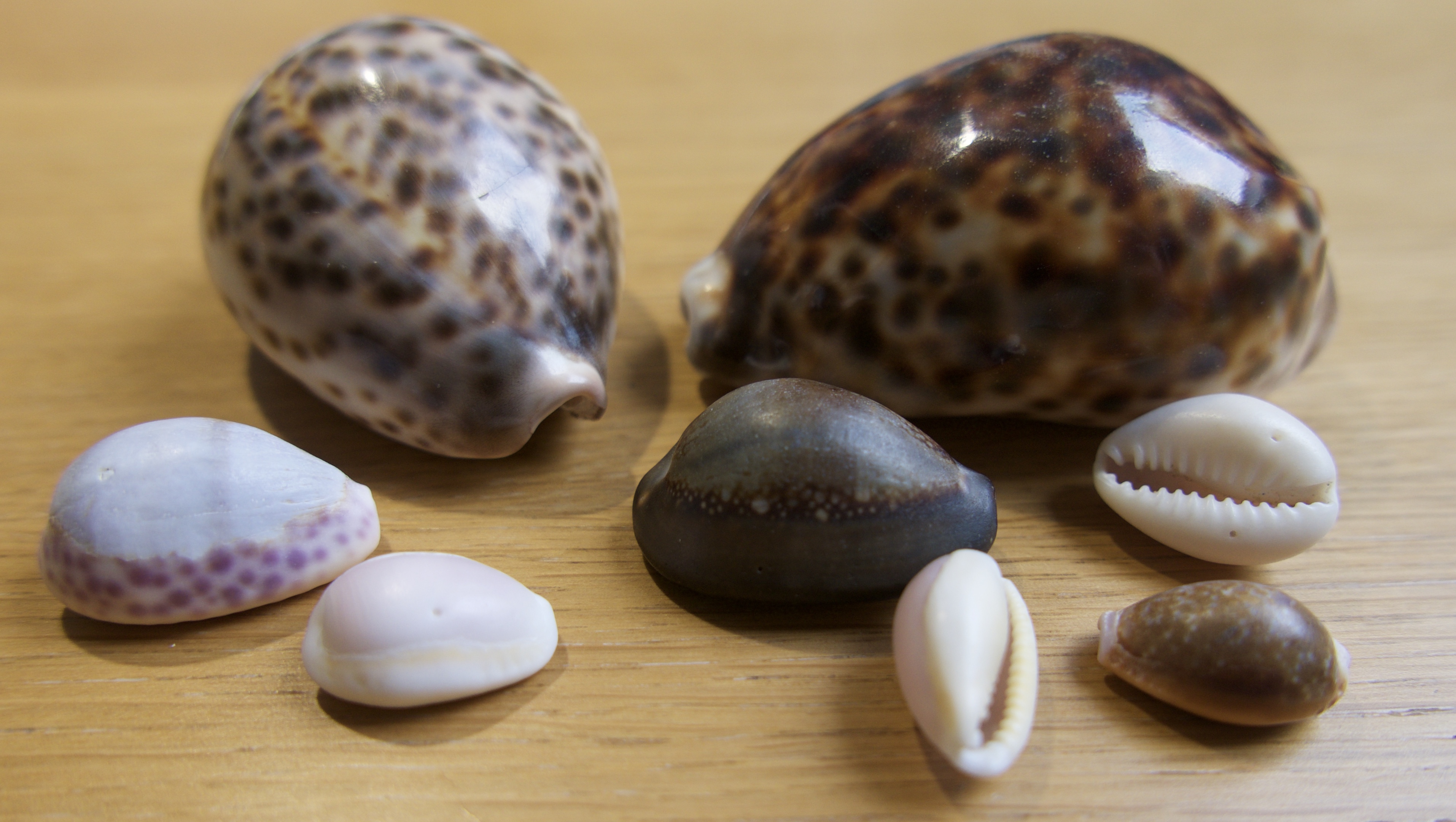
Interesting read. Makes you wonder what an individual can achieve when they put their mind to it.
Yes, and imagine what they could do if they had the right support.
This is just an amazing and fascinating story. Not simply because everything which is depicted and shown is absolutely breathtaking but also because the level of simplicity and purity that Bee transmits us is somehow a stimulus to interrogate ourselves on what civilization and non-civilization is, what is the border between the two conceptual terms, and, least but not last, who is the civilized one!
I have just adored this non-fictional narrative and I hope I can experience it too one day.
What I suggest is to open for Bee a crowdsourcing web platform, which activists and artists have been used so far, and which have turned to be very successful due to an increased level of attention of citizen to social and cultural issues. I will support it, indeed!
Thanks for the lovely story!
Thanks very much Alessandra for this detailed comment. I very much appreciate this comment from someone I respect. I am thinking of crowdsourcing if the multinationals don’t step up.